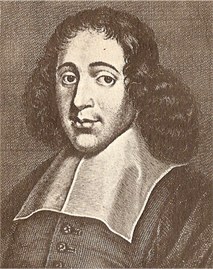Religion
Texts by Dr. Antonio Moreno González
On the centenary of Einstein's birth, Pope John Paul II, addressing the Pontifical Academy of Sciences, praised him "for the eminent contribution he made to the progress of science, that is, to knowledge of the truth present in the mystery of the universe...a truth inscribed in creation by the finger of God". Einstein - "the deeply religious non believer" - did not share the same God as the Pope's:
"I believe in Spinoza's God who reveals himself in the orderly harmony of what exists, not in a God who concerns himself with fates and actions of human beings."
More than as a belief, Einstein valued religion as an attitude to the world. Adolf Keller, the Zurich theologian who had met Einstein in his younger years, went to visit his old acquaintance when he was attending a theology seminar in Princeton in 1941. He gave an account of the meeting to Einstein's biographer, Carl Seelig, who remembers some of Keller's impressions:
"For Einstein, freedom is the greatest good of mankind. In our conversation he became very passionate talking about Germany under Hitler; he had renounced even scientific freedom, and with that he had prostituted himself to power. Speaking about this he said something which really stuck in my memory: 'I always hoped the German universities would launch the struggle for freedom. But I was wrong. However--he went on to say--even when the universities did nothing, at least the churches fought for freedom, both the Catholic and the Protestant church. As a Jew I want to acknowledge that. And that struggle must never be forgotten'. I am all the happier that Einstein recognised that because he always said he was a supporter of the spirit, not of any church."
Einstein considers that the "insurmountable conflict" between science and religion, which had gone on for centuries, lacked any consistent foundation. For him "science without religion is lame, and religion without science is blind". He even said once that science is to some extent a form of religion:
"Among all the most profound scientific talents, you would be hard put to find a single one that does not have its own religious sentiment. But it is something different to the religiosity of the layperson. For the layperson, God is a being from whose care one hopes to benefit and whose punishment one fears... But the scientist is imbued with the feeling of universal causality. For him, the future is something as inevitable and as determined as the past. In morals there is nothing divine; it is a purely human matter."
From his perspective on religion and civic education, he argued "the need for an ethical culture" promoted by the school to improve coexistence:
"The desire to fight for an ethic-moral structuring of our community life is of the greatest importance. In this aspect no science can save us. I really believe that the excessive emphasis on the purely intellectual (which tends to be directed towards effectiveness and towards the practical) in our education, has led to a weakening in ethical values."

The Dutch philosopher, Benito Spinoza (1632 - 1677), descendant of a Spanish Jewish family
